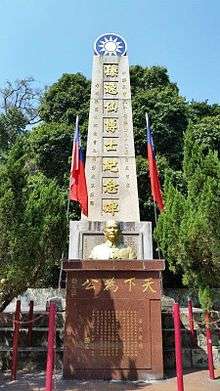Red House (Hong Kong)
Hung Lau (simplified Chinese: 红楼; traditional Chinese: 紅樓; literally: "Red House") is a house built between 1905 and 1910 on former farmland in Pak Kok, Tuen Mun, Hong Kong. It was used by the Hsing Chung Hui (興中會; Xingzhonghui; "Revive China Society") as a base for revolutionary activities against the Qing dynasty.[1]
Nature and locale

It is a Grade I historic building, a classification which does not mandate preservation. It is named for its red-pigmented external surface rendering. The two-storey house is a mix of Chinese and Western influences. Lying on the same plot of land and adjacent to the house is a garden commemorating Dr. Sun Yat-sen and one of few places in Hong Kong where the flag of the Republic of China is hoisted continuously. It is near the Tuen Mun Public Riding School, Butterfly Estate and Castle Peak.
History
Hong Kong merchant and financier of the original China Daily Li Ki-tong, who met Dr. Sun Yat-sen in 1895 and joined the Revive China Society in 1900, provided his farm to the Society as its secret base in 1901.[2] The farm provided cover and sustenance to the group for the planning of its coup attempts in Guangzhou and Wuhan.
The house and garden remained in the Li family as of 2011[3] but was subject of a controversial sale to a mainlander in November 2016.[4] It was declared a proposed monument by the Antiquities Advisory Board on 9 March 2017.[5]
References
- ↑ "List of historic buildings and structures in association with Dr. Sun Yat-sen and the revolutionaries in Hong Kong" (PDF). Antiquities Advisory Board. Retrieved 18 February 2017.
- ↑ "Revolutionary Activities of Li Ki-tong" (PDF). Antiquities and Monuments Office, HKSAR Government. Retrieved 18 February 2017.
- ↑ Ng, Joyce (28 March 2011). "Revolutionaries' secret base left to decay despite heritage". South China Morning Post. South China MOrning Post Publishers Ltd. Retrieved 18 February 2017.
- ↑ Cheng, Kris (17 February 2017). "Lawmaker suspects political reason behind sale of Tuen Mun property linked to China's 'founding father'". Hong Kong Free Press. Retrieved 18 February 2017.
- ↑ Cheng, Kris (9 March 2017). "House linked to China's 'founding father' granted temporary protective status after suffering further damage". Hong Kong Free Press. Retrieved 10 March 2017.
See also
| Wikimedia Commons has media related to Red House (Hong Kong). |
Coordinates: 22°22′40″N 113°57′35″E / 22.37767°N 113.95970°E